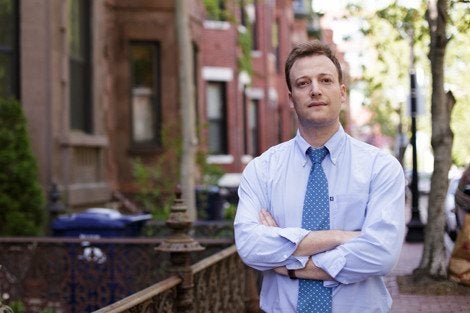May 23, 2014 — Zachary Gerson-Nieder spends a lot of time thinking about the role hospitals can play in communities. Of course they provide health care—but they also serve as regional economic anchors.
Which makes him wonder: How much do hospital administrators, city planners and other key stakeholders consider hospitals’ impact on communities? Is it a major focus or more of an afterthought?
To Gerson-Nieder, who graduates from Harvard School of Public Health (HSPH) this month with a master of science degree in health policy and management, such considerations should be anything but a postscript to policy decisions. He is deeply intrigued by the intersection of health care policy and economic development in communities.
To that end, Gerson-Nieder took courses at MIT’s Department of Urban Studies and Planning and Harvard’s Graduate School of Design to supplement his HSPH coursework. He studied topics such as municipal planning, neighborhood revitalization, public and private development, and state and local public finance—“all things which don’t necessarily have the most obvious connection to public health, but which I think play a pretty important role,” he said.
He is particularly interested in the role health providers play in Massachusetts’ “gateway cities”—mid-sized urban centers that have the potential to serve as regional economic anchors but face social and economic challenges, such as Lawrence, Lowell, New Bedford, and Fall River.
“A lot of smaller cities are really struggling,” said Gerson-Nieder. “If you look at who the largest employers are in those communities, health care institutions are consistently on the list. I would like to focus my work on strategies that communities can use when working with health care institutions, so that the long-term needs of the community are better integrated with the bottom line of those institutions. Overall, the goal is creating solutions that benefit all stakeholders. For example, if a hospital uses local vendors, it can benefit both the hospital and the community.”
From history to health policy
Six years ago, Gerson-Nieder’s focus was on history, not health policy. He’d just graduated from the University of Saint Andrews in Scotland with an undergraduate degree in modern history. “I was going to write history books,” he said.
But he had a change of heart and decided that he wanted to pursue work that would have a meaningful impact on the lives of others. Public health felt like a natural fit—partly because he grew up in a health care-oriented family. Gerson-Nieder’s mother is a nurse and his father is a family doctor who himself earned a master of science from HSPH, in nutrition and health policy and management, in 1977. “We’ve had lots of interesting conversations around the dinner table about both clinical health care and public health,” Gerson-Nieder said.
Before becoming a student, Gerson-Nieder worked at HSPH for three years with [[Sue Goldie]], Roger Irving Lee Professor of Public Health, who directs both the Center for Health Decision Science and the Harvard Global Health Institute. At the former, Gerson-Nieder was project manager for several large grants, including one focused on cost-effective approaches to reducing maternal mortality in several developing countries. At the latter, he developed key components for Harvard-wide curricula on global health.
Leadership, research skills
Gerson-Nieder has had leadership roles in two HSPH student groups. As president of HealthRoots, he helped bring nontraditional speakers to campus, including a housekeeper at a local hotel in Cambridge who discussed health risks posed by her work and ongoing efforts to create healthier conditions. As co-chair of the Student Leadership Circle, he supported efforts to give students real-world experience interacting and working with public health and public policy leaders.
Now Gerson-Nieder hopes to use some of the research methods he’s learned at HSPH— ways to uncover the most cost-effective health interventions, for example—to help create and strengthen connections between hospitals and the communities they serve in terms of goals, needs, and economic success. “So much of what happens in a hospital is not contained within its four walls,” he said.
photo: Emily Cuccarese
